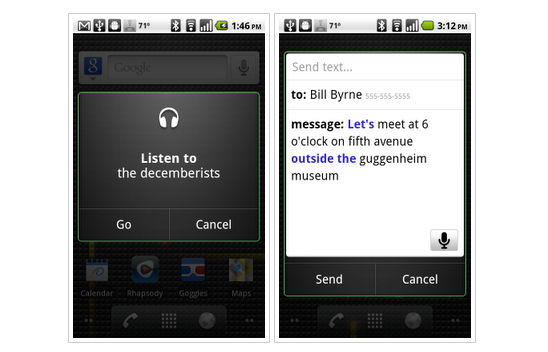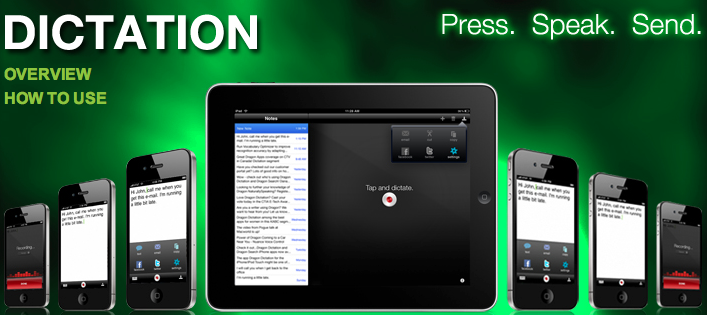
Last week Microsoft made a huge deal about the voice control that will be part of WindowsPhone 7. I watched the demo video and wasn’t impressed at all. As I posted last weekend, I am still perplexed as to why Microsoft wouldn’t just turn to Nuance and license their time-proven and excellent technology in order to ensure a level of voice control, and voice-to-text transcription that will work perfectly from the start.
Now Google has jumped into the ring as well. Their new Voice Action feature is part of a new version of the Voice Search application for Android phones. But the new system doesn’t just do voice search. It also lets you dictate email, set an alarm, send yourself a note, send text, listen to an artist/song/album, go to a website, navigate to a location and more. It all sounds pretty impressive, even if the feature is only available on Android devices running Android 2.2.

So what does Nuance think about this latest competitor? On the one hand both in a written release and during a conference call with them yesterday they stated that they are pleased to see how quickly “voice as interface” is being adopted. On the other hand, they are clearly nervous enough that they sent out this statement to address Google’s announcement. According to Mike Thompson of Nuance
This is yet another sign that speech is quickly becoming a primary interface for mobile phones – an industry we have pioneered over the course of the last decade, with Nuance technologies and applications powering voice capabilities on hundreds of millions of phone in recent years. Our newest Android and iPhone offerings this year have been met with critical acclaim and broad adoption, where in particular our work with T-Mobile on the Android-based 3G Slide was noted to put others’ to shame. Among industry experts and mobile consumers, accuracy, performance and ease-of-use are the pillars to success for this class of interface. At Nuance, we pride ourselves on leading the industry in each of the areas, drawing on the strengths of our Dragon Dictation technology, language support and solutions that work on all major device platforms. Speech is clearly here to stay and through our work we are determined to see it proliferate broadly across consumer devices and markets for generations to come.
So why would anyone who has an Android device opt to use Nuance’s offerings instead of Google’s? There are two thing that come to mind.
The first issue is accuracy. Dragon Dictation’s accuracy is nothing short of magic. It is fast, it is usually spot on. And it works without the need to train the transcription. (Teach the app to recognize your voice patterns.) In fact, I put Nuance’s Dragon for Email on Elana’s BlackBerry this morning and her first message was transcribed perfectly. And that was the very first time she had ever used it.
Google’s Voice Action MIGHT be excellent (I have not had a chance to try it yet) but if the accuracy of Google Voice’s transcription is any indication it will fall short of Dragon’s offerings. Here is an example of the comments from Mike Thomson as transcribed by both Dragon Dictation AND Google Voice. (Note that I had both going at the same time so they both “heard” the exact same sounds at the exact same time.)
Dragon Dictation
According to Mike Thompson of Nuance, this is yet another sign that speech is quickly becoming the primary interface for mobile phones and industry we have pioneered over the course of the last decade, with Nuance technologies and applications powering voice capabilities on hundreds of millions of phones in recent years. Our newest android and iPhone offerings this year having that was critical of claim and broad adoption, where in particular, our work with T-Mobile on the android-based 3G slide was noted to put others to shame. Among industry experts and mobile consumers, accuracy, performance and ease-of-use are pillars to success for this class of interface
Google Voice-
According to Mike Thomson of new balance, come out. This is yet another sign that speech is quickly becoming the primary interface from mobile the phones. And it is St. We have Pioneer over the course of the last decade to come up with new ones technologies and applications. Our invoice capabilities on hundreds of millions of phones in recent years period our newest enjoyed and iPhone offerings of this year, have been met with critical acclaim, and broad adoption come up. Where in particular. I work with T-Mobile on the and rate base 3. G Slide, was noted to put others to shame period among industry experts and mobile consumers come up, accuracy. Com a performance and ease of use. Our pillars to 6s for this class of interface.
Now tell me, which transcription is actually usable?
The second issue is privacy. In my opinion Google knows way too much about all of us already. Start using Google for emails, directions etc and the amount they know about you is going to increase exponentially. One of the most striking points made during my conference call with Nuance’s reps was the fact that Google’s raison d’être is to collect information on you and use it for their own purposes (to make money) while Nuance’s raison d’être is to make great voice to text applications. Google clearly making a huge investment in Voice Actions. They aren’t doing it to be nice. They are doing it to gather information so they can make even more money. Nuance isn’t developing Dragon to be nice either but their goal is to make the best products they can so that people will buy them and OEMs will license them. As a result, if an OEM wants to increase the degree of privacy end-users have when using Dragon Nuance can and will do that. And if customers scream about privacy Nuance will respond. How do I know this is the case? Well when Dragon Dictation first came out the app automatically uploaded all your contacts to their server so that name recognition would be better. People screamed… loudly… and Nuance quickly responded with an update that made this optional. In other words, while Voice Actions may be free there IS as cost to using it.
Don’t get me wrong. I’m happy to see Google enter this area. The more major players in the space the more everyone will have to continually keep upping their game. That alone is a positive. Personally, though, regardless of the device I’m using I’ll keep using Dragon.
Now if Apple would just let them integrate it a bit more deeply into iOS…
(Quick aside- I’m typing this on my MacBook Pro, and the spelling of raison d’être didn’t look right to me. I grabbed my iPhone, said it, and Dragon spelled it and then confirmed the spelling was correct. My point… Dragon is also a great ade to pur spelllers licke me.)

Google Voice Actions Adds Yet Another Competitor to the Rapidly …: Last week Microsoft made a huge deal about th… http://bit.ly/a9Rz91